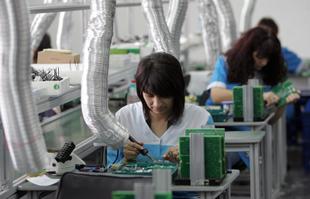Barriers to Effective Worker-Driven Monitoring
Electronic Watch's worker-driven monitoring process is separated into phases of understanding the issues, presenting evidence to industry and affiliates, and developing remedy, with workers always at the centre. One issue that can hinder this process is when workers avoid communication with our monitoring partners, due to fear or other factors. To explore solutions to this and similar barriers, Electronics Watch organised a workshop in December with Central European monitoring partners Periféria (Hungary), Polish Institute for Human Rights and Business (Poland), and Centre for Social Issues (Czechia).
Aykut Kazanci, Monitoring Capacity Manager from Electronics Watch, led a discussion around how we can mitigate the impact from these barriers. Participants introduced issues from their fieldwork and suggested possible remedies.
One of the issues mentioned was the fear amongst employees, including management staff, of breaching their contracts by revealing factory information. In many cultures, lack of trust in surveys or NGO researchers makes it preferable to reach out to workers indirectly, via trade unions. Gender can also be a barrier to successful worker interviews, with male to male, female to female being the preferred format. Historical issues were cited as important to understanding current issues, as part of root cause analysis. If there were unfair dismissals later resolved, for example, it is essential to maintain detailed information about how and why, to help prevent future occurrences. Finally, the difficulty to provide strong evidence from workers’ testimonies or documents poses a challenge for worker-driven monitoring.
Following the success of this workshop, Electronics Watch plans to organize similar workshops with all monitoring partners on a regular basis, and to draft a comprehensive guidance document on barriers to be annexed to the Electronics Watch Monitoring Methodology Guidance.


